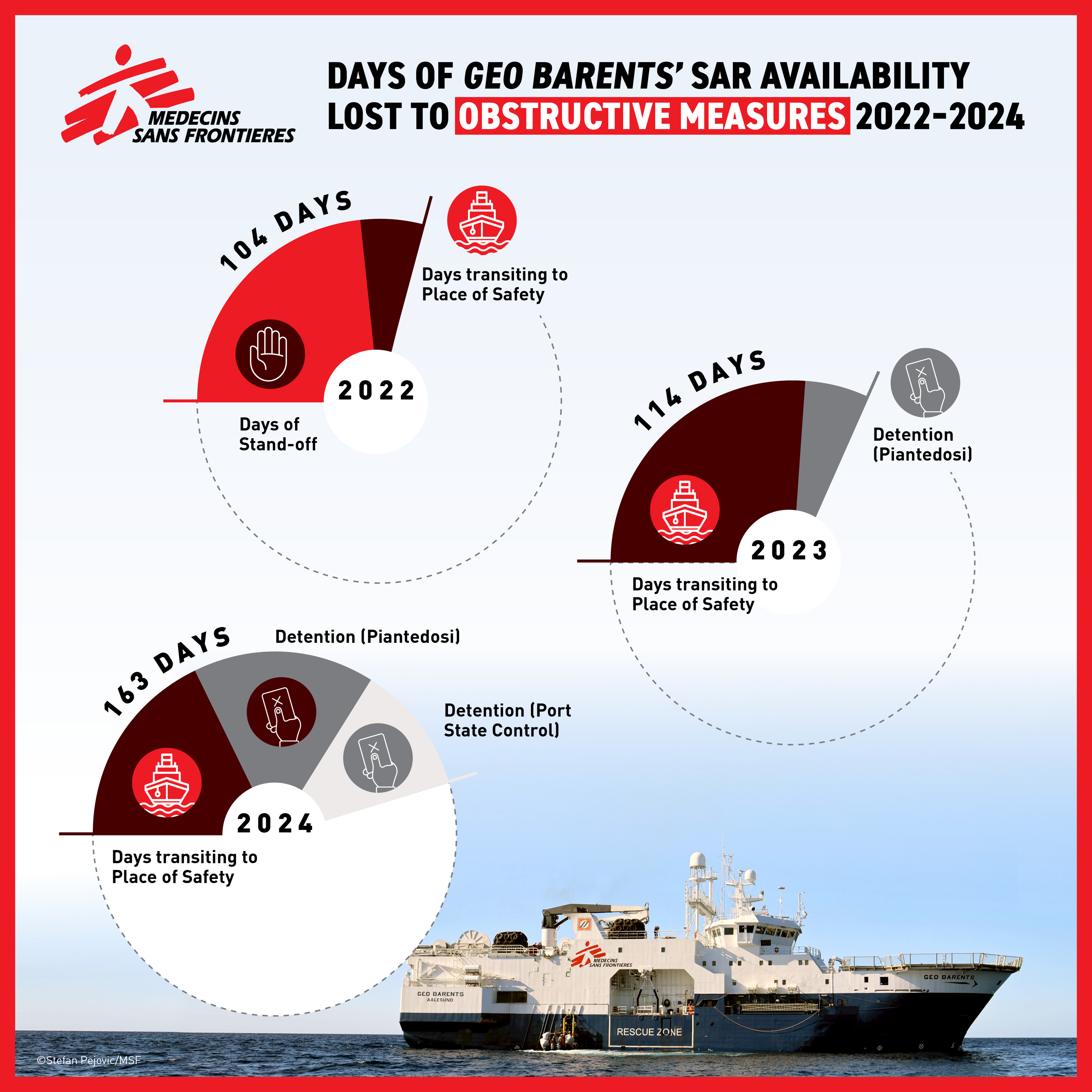New MSF report denounces violence and obstruction of lifesaving response in the Central Mediterranean
Press Release
Press Release
12 June 2025
Rome, 12 June 2025 – The orchestrated removal of search and rescue (SAR) ships, such as the Geo Barents, from the Central Mediterranean cuts a lifeline for survivors fleeing horrendous violence in Libya. This is the conclusion of an advocacy report released today by the international medical humanitarian organisation, Médecins Sans Frontières/Doctors Without Borders (MSF). The report, titled Deadly Manoeuvres: Obstruction and Violence in the Central Mediterranean is based on operational and medical data as well as survivors' testimonies collected by MSF teams on board the search and rescue (SAR) vessel Geo Barents during 2023 and 2024.
"The Piantedosi Decree presents an unprecedented structured and institutionalized mechanism for the obstruction of civil search and rescue activities," Juan Matias Gil, MSF SAR representative
The report details how, after more than two years of operating under restrictive Italian laws and policies, particularly the Piantedosi Decree and the practice of distant port assignments, the ability of SAR vessels to provide lifesaving assistance was severely limited, ultimately leading to the decision to cease operations on the Geo Barents in December 2024.
Due to the restrictions, the number of people that the Geo Barents was able to rescue declined dramatically in 2024 (2,278) to half the 2023 total (4,646). Despite this, the overall number of medical referrals increased – particularly urgent referrals – which went up by 14 per cent, suggesting that a considerably higher percentage of those rescued were in a critical state and required vital specialist care on land.

Days of Geo Barents SAR availability lost to obstructive measures 2022-2024
The report also narrates testimonies from people who managed to flee Libya, documenting violent interceptions they experienced at sea, and being forcefully returned to Libya, as part of the broader externalisation effort to prevent arrivals to Europe.
“The Piantedosi Decree presents an unprecedented structured and institutionalized mechanism for the obstruction of civil search and rescue activities,” says Juan Matias Gil, MSF SAR representative. “The impact of these sanctions has worsened over the years; the rescue capacity of our SAR vessel has been significantly underutilised and actively undermined.”
The report also narrates testimonies from people who managed to flee Libya, documenting violent interceptions they experienced at sea, and being forcefully returned to Libya, as part of the broader externalisation effort to prevent arrivals to Europe. “The testimonies, data and evidence we have collected during these years demonstrate collusion of Italy and the EU with the Libyan Coast Guard (LCG) and other armed actors, carrying out interceptions and pushing people back to the circle of extortion and abuse,” adds Gil.
According to MSF medical data, in 2024, every patient (124) seen by the psychologist on the Geo Barents reported experiencing physical and/or psychological violence during their journey, with half of these patients having identified detention as the primary setting where abuse took place.
The report concludes by demanding that Italian authorities cease hindering lifesaving operations at sea and imposing sanctions on NGO search and rescue vessels. It calls on the EU and its member states to immediately halt financial and material support to the Libyan Coast Guard and stop deliberately facilitating the forced return of people to Libya.
Notes for the editor:
The report can be downloaded in English and Italian.
Interviews can be arranged with spokespersons who speak English, French, Italian, Spanish, Dutch and Arabic. For more information, please contact Mohamad Cheblak, Field Communications Coordinator, at sar-fcc@oca.msf.org.